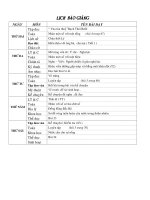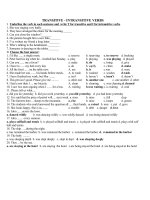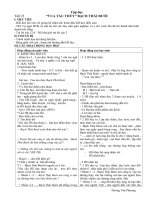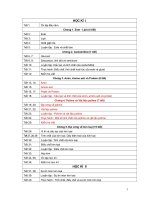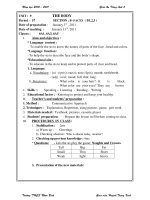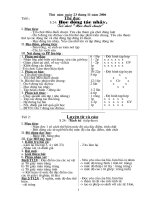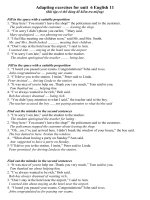bai soan E 12 Unit 6
Bạn đang xem bản rút gọn của tài liệu. Xem và tải ngay bản đầy đủ của tài liệu tại đây (138.36 KB, 7 trang )
<span class='text_page_counter'>(1)</span><div class='page_container' data-page=1>
* VOCABULARY:
Recommendation [,rekəmen'dei∫n] (n) sự tiến cử, lời giới thiệu
• jot down [dʒɔt daun] (v) ghi lại tóm tắt
• keeness [kinnis] (n) sự say mê, sự nhiệt tình
• be keen on sth/doing sth: say mê
• qualification [,kwɔlifi'kei∫n] (n) văn bằng, bằng cấp
• interview ['intəvju] (n) cuộc phỏng vấn
• interviewer ['intəvjuə] (n) người phỏng vấn
• interviewee ['intəvju’i] (n) người được phỏng vấn
neatly [‘nitli] (adv) gọn gàng
• formally ['fɔmlli] (adv) chính thức, trang trọng
• to concentrate on ['kɔnsntreit] tập trung vào
• to make real effort: ['efərt] hết sức cố gắng
• technical ['teknikl] (adj) chun mơn
• aspect ['ỉspekt] (n) khía cạnh
• to stress [stres] nhấn mạnh
• enthusiasm [in'θjuziỉzm] (n) sự hăng hái, sự nhiệt tình
• sense of responsibililty: [rɪspɑ:nsɪ'bɪlətɪ] ý thức trách nhiệm
to save one’s life: cứu sống
• electrician [ilek'tri∫n] (n) thợ điện
• electricity [i,lek'trisiti] (n) điện
• electrify [i'lektrifai] (v) điện khí hố, nạp điện
• journalist ['dʒənəlist] (n) nhà báo
• hotel receptionist [hou'tel ri'sep∫ənist] (n) nhân viên tiếp tân khách sạn
• computer programmer: lập trình viên máy tính
• rewarding [ri'wɔdiη] (adj) bổ ích đáng làm
• fascinating ['fỉsineitiη] (adj) tuyệt vời
• fantastic [fỉn'tỉstik] (adj) tuyệt vời
tourist guide (n) ['tʊrɪst gaɪd] hướng dẫn viên du lịch
• to take care of: chăm sóc
• imagine [i'mỉdʒin] (v) tưởng tượng • imaginary [i'mỉdʒinəri] (adj)
• character ['kỉriktə] (n) nhân vật
• working condition: điều kiện làm việc
• farming technique (n) ['fɑ:rmɪŋ tek'ni:k] kỹ thuật canh tác
• predict [pri'dikt] (v) dự đóan • to make some prediction (v)
• wholesale ['houlseil] (n) sự bán sĩ >< • retail [‘riteil] (n) sự bán lẻ
• accountant [ə'kauntənt] (n) nhân viên kế tóan
• lawyer ['lɔjə] (n) luật sư
• job market (n) lực lượng lao động
• workforce ['wək'fɔs] (n) thị trường việc làm
• recommendation [,rekəmen'dei∫n] (n) sự tiến cử, lời giới thiệu
• jot down [dʒɔt daun] (v) ghi lại tóm tắt
• keeness [kinnis] (n) sự say mê, sự nhiệt tình
• be keen on sth/doing sth: say mê
• qualification [,kwɔlifi'kei∫n] (n) văn bằng, bằng cấp
• interview ['intəvju] (n) cuộc phỏng vấn / interviewer ['intəvjuə] (n) người phỏng vấn
• interviewee ['intəvju’i] (n) người được phỏng vấn
</div>
<span class='text_page_counter'>(2)</span><div class='page_container' data-page=2>
• service job: nghề dịch vụ
• to be grouped into: được phân thành lọai
• category ['kỉtigəri] (n) hạng, loại
* Grammar: Relative Pronouns and Relative Adverbs.
1. Relative Pronouns: who, whom, whose, which, where, when, that, of which, why (cách dùng của các đại từ
liên hệ)
CÁCH DÙNG CHỦ NGỮ TÂN NGỮ SỠ HỮU
Thay thế cho danh từ chỉ
người làm
WHO WHOM WHOSE
Thay thế cho danh từ chỉ
vật làm
WHICH WHICH OF WHICH /
WHOSE
Thay thế cho danh từ chỉ
nơi chốn
WHERE = IN WHICH
Thay thế cho danh từ chỉ
thời gian
WHEN
Dùng trong thể nhấn mạnh
và thay thế cho WHO,
WHICH trong mệnh đề
khơng có dấu phẩy
THAT
EX: It is the English that causes me a lot of difficulties.
It is your father that helped me yesterday.
Được dùng để thay cho
cụm từ chỉ lý do
WHY = FOR + WHICH
We don’t know the reason why John gave up his part-time job.
2. Kinds of relative clauses.
a. Restrictive (Defining) Relative clauses:
+ Mệnh đề quan hệ xác định: được sử dụng với tất cả các đại từ và trạng từ quan hệ.
+ Mệnh đề quan hệ xác định là loại mệnh đề cần thiết vì danh từ đi trước chưa xác định, khơng có nó câu
sau sẽ không đủ nghĩa.
Ex: The man whom you met yesterday was my uncle.
b. Non - Restrictive (Non - Defining) Relative clauses:
+ Mệnh đề quan hệ không xác định: được sử dụng với tất cả các đại từ và trạng từ quan hệ ngoại trừ
THAT.
+ Mệnh đề quan hệ xác định là loại mệnh đề khơng cần thiết vì danh từ đi trước đã được xác định, khơng
có nó câu vẫn đủ nghĩa.
Ex: Shakespeare, who wrote Hamlet, was a famous playwright.
3. Chú ý:
a/ Khi who, whom, which, that là tân ngữ của mệnh đề quan hệ xác định thì ta có thể lượt bỏ đi.
Ex: The student (whom/who) we met this morning has won the scholarship.
The motorbike (which/ that) you lent me yesterday is a good one.
b/ That không được sử dụng ở mệnh đề quan hệ không xác định.
c/ Không sử dụng who, that, where,when,why sau giới từ.
Ex: We went shopping in the shopping center in which (that) we can buy almost everything.
d/ which còn được sử dụng để chỉ định cho cả một mệnh đề đi trước, which còn được gọi là từ nối (connector).
Ex: Both of our children passed the exam with high marks, <i>which</i> made us very happy.
*Choose the word which has the underlined part pronounced differently from the rest.
1. a. worker b. whom c. interview d. answer
2. a. honest b. holiday c. home d. happiness
3. a. character b. teacher c. chemist d. technical
4. a. interview b. minute c. question d. suitable
</div>
<span class='text_page_counter'>(3)</span><div class='page_container' data-page=3>
* Choose a, b, c, or d that best completes each unfinished sentence, substitutes the underlined part, or has a close
meaning to the original one.
6. It is of great importance to create a good impression _______ your interviewer.
a. on b. about c. for d. at
7. Good preparations _______ your job interview is a must.
a. with b. upon c. in d. for
8. Many children are under such a high _______ of learning that they do not feel happy at school.
a. recommendation b. interview c. pressure d. concentration
9. She likes meeting people and travelling so she wants to apply for a _______ of a receptionist or tourist guide.
a. location b. position c. site d. word
10. To my _______, I was not offered the job.
a. happiness b. dream c. joy d. disappointment
11. Being well-dress and punctual can help you create a good _______ on your interviewer.
a. impression b. pressure c. employment d. effectiveness
12. Many people will be out of _______ if the factory is closed.
a. work b. career c. profession d. job
13. His dream of becoming _______ doctor became true after seven years of learning hard.
a. a b. an c. the d. Ø
14. _______ information you need is in this book. Read it carefully.
a. A b. An c. The d. Ø
15. Doctors have to assume _______ for human life.
a. responsible b. responsibly c. responsibility d. responsibles
16. _______ is increasing, which results from economic crisis.
a. Employment b. Unemployment c. Employ d. Unemployed
17. He was offered the job thanks to his _______ performance during his job interview.
a. impress b. impression c. impressive d. impressively
18. There was no one _______.
a. I could ask for help b. when I could ask for help c. I could ask whom for help d. for that I could ask for help
19. The children were quite attracted by the tamer and his animals _______ were performing on the stage.
a. that b. which c. whom d. who
20. Is there anything else _______ you want to ask?
a. what b. where c. whom d. that
21. I come from the Seattle area, _______ many successful companies such as Microsoft and Boeing are located.
a. which b. that c. where d. whom
22. They have just visited the town _______ location was little known.
a. where b. whose c. which d. that
23. _______ one of the most creative artists in rock 'n roll, came from California.
a. Frank Zappa, who was b. Frank Zappa was c. Frank Zappa, that was d. Frank Zappa whom was
24. He came to the party wearing only a pair of shorts and a T-shirt, _______ was a stupid thing to do.
a. who b. whom c. which d. that
25. He lives in a small town _______.
a. where is called Taunton b. which is called Taunton c. is called Taunton d. that called Taunton
26. The house _______ is more than 100 years old.
a. where I live b. in where I live c. in that I live d. where I live in
27. _______ want to get a god job have to have certain qualifications and experience.
a. Who b. Those which c. Those who d. Those whom
28. Wild fires are common in the forest areas of Australia, of the US and Canada, _______ the climate is moist.
a. in where b. in that c. where d. which
29. King Henry, _______ was Elizabeth I, led England into the Age of Empire.
a. daughter b. whom daughter c. which daughter d. whose daughter
* Read the pasage and choose the best answers.
</div>
<span class='text_page_counter'>(4)</span><div class='page_container' data-page=4>
more confident and relaxed. So, practice your answers to common questions. Make a list of questions to ask, too.
Almost all interviewers will ask if you have questions. This is a great opportunity for you to show your keenness,
enthusiasm, and knowledge.
Make a great impression. The interview is your chance to show that you are the best person for the job. Your
application or resume has already exhibited that you are qualified. Now it is up to you to show how your skills and
experience match this position and this company. The employer will be looking and listening to determine if you are a
good fit. He/she will be looking for a number of different qualities, in addition to the skills that you possess. To make
the best impression, dress appropriately; express your strengths; arrive early, by about 10-15 minutes; be enthusiastic;
shake hands firmly; be an active listener; sit up straight and maintain eye contact; and ask questions
After the interview, follow up with a thank-you note. This is a chance for you to restate your interest and how you can
benefit the company. Your best bet is to try to time it so that the note gets there before the hiring: decision is made.
You should also follow up with a phone call if you do not hear back from the employer within the specified time.
30. The pronoun it refers to ________.
a. the job b. the interview c. the interviewer d. the preparation
31. What does the writer advise you to practice?
a. Asking and answering questions related to the job. b. Making products that the company produces.
c. Providing services that the company serves. d. Meeting some customers and competitors.
32. Which should not be shown during your interview?
a. Punctuality b. A firm hand shaking c. Being properly-dressed d. Weaknesses
33. You can show your qualifications in the
a. dressing style and punctuality b. competing with the competitors
c. resume and letter of application d. eye contact with the interview
34. Which is not included in the writer's advice?
a. You should not communicate with the interviewer after the interview.
b. You 'should make the best impression in the interview.
c. You should write a note to say thanks to the interviewer after the interview,
d. You should telephone the interviewer for any information after the interview.
II/ Vocabulary and Grammar
35. I have a lot of work to do this week. I’m under _______________.
A. restriction B. tension C. stress D. limitation
36. You should show that you might be the most suitable _______________ for the job.
A. person B. partner C. labourer D. candidate
37. Getting promotion also means getting more _______________.
A. responsibility B. ability C. advisability D. creativity
38. Newspapers vary greatly in their _______________ to the economic reforms.
A. opinion B. view C. attitude D. bias
39. We are_______________ on other countries for most our machinery.
A. dependent B. independence C. dependable D. dependability
40. They are the people_______________ houses were destroyed by the flood.
A. whom B. whose C. what D. which
41. I read about the child _______________ life was saved by her pet dog.
A. whom B. who C. whose D. her
42. Some of the guests _______________ I invited didn’t come.
A. whose B. whom C. them D. which
43. The police have to try to catch the men _______________ drive dangerously.
A. who B. whom C. they D. which
44. The wholesale price of this coat is $50; the _______________ price is $55.
A. retail B. deposit C. commercial D. charge
45. The doctor had been working hard all morning without a _______________.
A. break B. rest C. interval D. pause
46. How many candidates _______________ for the exam last week?
A. took B. enrolled C. entered D. participated
47. Every house in this village was _______________ damaged by the storm last night.
A. strongly B. strictly C. severely D. hardly
48. It’s so noisy outside that I couldn’t _______________ on my study.
</div>
<span class='text_page_counter'>(5)</span><div class='page_container' data-page=5>
49. Neither the students nor their lecturer _______________ English in the classroom.
A. uses B. use C. are using D. have used
50. You won’t be allowed to teach here _______________ you show your qualification.
A. since B. unless C. for D. if
51. If I _______________ ten years younger, I would do yoga every day.
A. am B. be C. were D. had been
52. The artist,_______________ painting you bought, is a classmate of mine.
A. whom B. whose C. from whose D. from whom
IV/ Cloze text
Education systems are established to provide education and training, in most cases for children and the young.
A curriculum defines what students should know, understand and be (34)_______________ to do as the result of
education. A teaching profession delivers teaching which enables learning, and a system of policies, regulations,
examinations, structures and funding enables (35)_______________ to teach to the best of their abilities. Sometimes
education systems can be used to (36)_______________ ideals as well as knowledge, which is known as social
engineering. Education is a broad concept; it refers to all the experiences in which children can learn something.
Instruction refers (37)_______________ the international facilitating of learning toward identified goals, delivered
either by an instructor or other forms. Teaching refers to learning facilitated by a real instructor. Training refers to
learning toward preparing learners with specific knowledge, skills, or abilities that can be applied
(38)_______________.
53. A. good B. possible C. kind D. able
54. A. engineers B. doctors C. teachers D. students
55. A. promote B. see C. help D. use
56. A. in B. on C. at D. to
57.
A. early
B. hardly
C. immediately
D. lately
<i>* Combine these pairs of sentences, using WHERE, WHICH, WHO, WHOM, WHOSE, THAT… </i>
1. The girl is sitting by Jack. She is Mary.
2. Can you understand the question? He asked you the question last time.
3. Is that the girl? We saw her on T.V last night.
4. The farm produces milk. We visited it last Sunday.
5. At last he married the girl. He loved her.
6. The man is an engineer. We play with his daughter everyday.
7. He didn’t receive the letter. I sent him the letter last January.
8. He often tells me something about his village. He was born there.
9. My sister wants to speak to you. You met her at my birthday party.
10. The children like the funny stories. Their grandmother tells them those stories every evening.
11. Jack London is a famous American writer. He wrote “Iron heel”.
12. The boy is sitting next to Mary. He is Jack.
13. I didn’t receive the letter. My mother sent me the letter last month.
14. The factory makes exported furniture. We visited it yesterday.
15. The baby likes those songs. His grandmother sings those songs every evening.
16. The man is a postman. I love his daughter very much.
17. Is that the man? You talked about him several times.
18. He often tells me about his hometown. He spent his childhood there.
19. Have you met the girl? The girl’s birthday party was held in Omni hotel.
20. My sister wants to speak to you. You met her in the Youth Club the day before yesterday.
21. Mrs. Jackson is a businessman. She lives on the second floor.
22. Michael Faraday was an English scientist. He is famous in the history of electricity
<b>* Stress: </b>
<b>1. Dấu nhấn trong từ có 2 âm tiết thường nằm ở: + vần thứ 2 đối với động từ.</b>
+ vần thứ 1 đối với danh từ hoặc tính từ.
Notes: - âm tiết cĩ nguyên âm là /ə / luơn là âm yếu, khơng nhấn.
- âm tiết thứ hai có nguyên âm là âm dài , nguyên âm đôi hoặc âm tiết thứ 2 có tận cùng là 2 phụ âm thì
thường nhấn âm thứ 2
</div>
<span class='text_page_counter'>(6)</span><div class='page_container' data-page=6>
<b>a. Dấu nhấn thường nằm ở vần trước ion, ial, ical, ity, itive, itant, ic, ous, ual .. : mathematical, </b>
magic ..
<b>b. Đối với những từ tận cùng là: fy, ate, ize…. Dấu nhấn sẽ nằm ở vần thứ 3 đếm từ dưới lên : </b>
delicate …
<b>c. Dấu nhấn thường nằm ở chính những vần oon, ese, ee, oo ……. : bamboo, afternoon …………</b>
<b>d. Danh từ kép có dấu nhấn nằm ở danh từ đứng trước : bookshop, welfare ………..</b>
<b>* Choose the word whose main stress is placed differently from the others in each group:</b>
1. A. private B. property C. approach D. foreign
2. A. outnumber B. continent C. scholarship D. illustrate
3. A. nation B. possess C. themselves D. provide
4. A. different B. instruction C. anything D. singular
5. A. meaning B. business C. recognize D. prediction
6. A. example B. following C. homonym D. difficulty
7. A. understand B. overcome C. disappoint D. apparent
8. A. maintain B. reclaim C. enjoy D. concert
9. A. suggestion B. cigarette C. environment D. protection
10. A. necessary B. continue C. irrigate D. different
11. A. against B. believe C. drainage D. enrich
12. A. element B. fertilizer C. quantity D. erosion
13. A. American B. represent C. discover D. adventure
14. A. experience B. communicate C. frightening D. inherit
15. A. disappoint B. ancestry C. comfortable D. heavily
16. A. repeat B. between C. caress D. welfare
17. A. military B. committee C. intimacy D. surgery
18. A. before B. arrive C. imply D. countless
19. A. incredible B. humidity C. necessity D. definition
20. A. begin B. mountain C. kingdom D. passage
21. A. dinosaur B. calendar C. eternal D. history
22. A. document B. develop C. opponent D. astonish
23. A. definition B. production C. situation D. politician
24. A. photography B. qualification C. occasion D. Canadian
25. A. ancient B. edible C. visual D. delicious
26. A. personal B. entry C. personnel D. sample
27. A. accordance B. understand C. acupuncture D. incomplete
28. A. appropriate B. emotion C. pronounce D. situation
29. A. cultivate B. machine C. terminate D. operate
30. A. prediction B. judgment C. intelligent D. compulsion
31. A. unlucky B. displeased C. courage D. encourage
32. A. combination B. illustration C. comprehension D. origin
33. A. follow B. apology C. experience D. direct
34. A. explain B. obtain C. promise D. suspect
35. A. national B. complain C. alone D. accept
36. A. community B. peninsula C. participant D. concentration
37. A. accuracy B. individual C. recreation D. independence
38. A. accident B. direction C. factory D. hospital
39. A. beginner B. encounter C. disappear D. remember
</div>
<span class='text_page_counter'>(7)</span><div class='page_container' data-page=7></div>
<!--links-->
